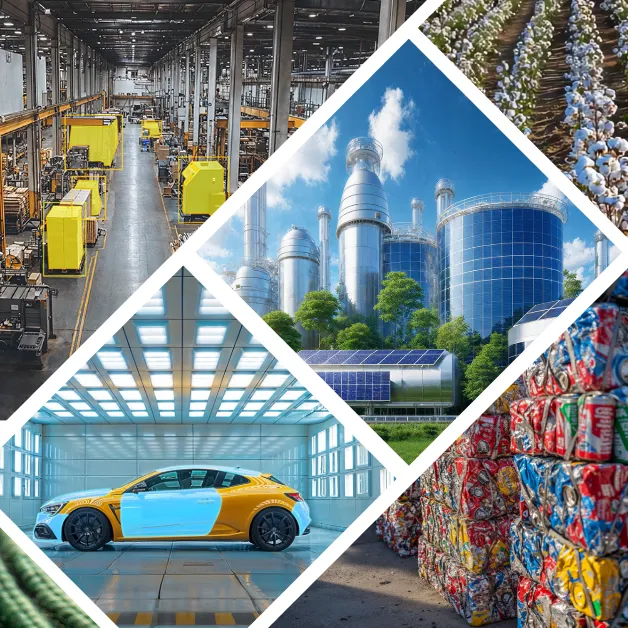Sustainable Manufacturing
Greener Solutions for Global Impact
Sustainable Manufacturing for an Eco-Conscious Future
Why is sustainable manufacturing important? In today's rapidly evolving world, sustainability in the manufacturing industry and supply chains aren't just optional, but crucial. Sustainable manufacturing is the ability for manufacturers to leverage the latest technologies to reduce waste, cut energy use and improve efficiencies across the product lifecycle. Achieve sustainable objectives by connecting the virtual and real worlds of value networks to collaborate, model, optimize, and perform.
Powered by the 3DEXPERIENCE platform, DELMIA is at the forefront, offering groundbreaking solutions with virtual twin technology to revolutionize your operations for a sustainable tomorrow. Exceed environmental standards by reducing emissions, minimizing waste, and embedding recycling into your processes. Through predictive analytics and real-time monitoring, manufacturers can optimize energy use and decrease greenhouse gas emissions that aid in decarbonization. Our virtual twin technology lets you fine-tune systems virtually before real-world deployment, ensuring precision and impact.
Accelerate Sustainability
Reduce emissions, cut down waste and integrate recycling into your production processes.
You can revolutionize:
- Supply chain planning by employing advanced technologies such as virtual twins and predictive analytics.
- Enhanced recycling by promoting a virtual world where manufacturers can evaluate the environmental impact of materials and processes, ensuring products are easier to recycle and contribute to a closed-loop system that is central to the circular economy.
- Manufacturing and operations processes by leveraging advanced virtual twin technology to enable precise simulations that optimize resource use and minimize waste.
Emissions Avoidance
Drive Green Manufacturing Operations
At DELMIA, we believe in the power of innovation and data-driven strategies to drive meaningful, sustainable change while remaining profitable. Embark on this journey with us, and let's create a future that benefits both your business and our planet. Explore our solutions and see how we can help your organization lead the way in green manufacturing.
- Virtual Twin Experience
- Supply Chain
- Manufacturing Operations Management
Virtual Twin Experience
DELMIA Virtual Twin Experience is shaking up the manufacturing world with its dynamic approach to sustainability. By incorporating circular economy principles into its innovative solutions, DELMIA empowers you to rethink product lifecycles—from design to disposal—ensuring minimal waste and maximum recyclability.
This bold strategy not only revolutionizes your resource management, but also propels you toward a greener future. Don't miss out on exploring how DELMIA sets the stage for your sustainable transformation and discovering the cutting-edge solutions leading to this exciting change.
Supply Chain
DELMIA Supply Chain Planning solutions are designed to elevate sustainability in your operations. A precision supply chain virtual twin, with advanced optimization algorithms, real-time visibility, and predictive analytics, DELMIA empowers businesses to reduce waste and carbon footprints.
Leverage these innovative solutions to enhance sustainable logistics, network efficiency and align your supply chain with environmental goals for responsible, sustainable practices.
Manufacturing Operations Management
DELMIA Manufacturing Operations Management (MOM) solution provides key capabilities for manufacturing sustainability. IIoT (Industrial Internet of Things) connectivity enables monitoring of production resources in real time. This provides visibility to inefficiency and enables intervention through machine maintenance and process improvement. This in turn leads to higher quality and reduced scrap, which reduces waste in both lost material and repeat production. Increased efficiency reduces CO2 footprint by maximizing products produced per time period. Connection to environmental systems, like water and energy consumption, enables identification of hotspots enabling targeted reduction measures.
Virtual Experience
Putting Sustainability into practice with DELMIA solutions
Becoming greener, how does that translate into manufacturing & supply chain?
From optimizing production to decarbonizing your supply chain, this hands-on immersive experience empowers you to see the impact firsthand explore how the full DELMIA suite of solutions can help your organization drive efficiency and sustainability.
What Our Customers Say
Start Your Journey
The world of Manufacturing is changing. Discover how to stay a step ahead with DELMIA.
FAQ on Sustainable Operations & Production Manufacturing
Learn What DELMIA Can Do for You
Speak with a DELMIA expert to learn how our solutions enable seamless collaboration and sustainable innovation at organizations of every size.
Get Started
Courses and classes are available for students, academia, professionals and companies. Find the right DELMIA training for you.
Get Help
Find information on software & hardware certification, software downloads, user documentation, support contact and services offering







